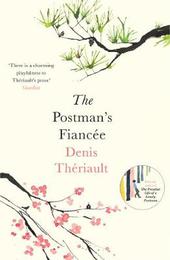
|
The Postman's Fiancee
Paperback / softback
Main Details
| Title |
The Postman's Fiancee
|
| Authors and Contributors |
By (author) Denis Theriault
|
|
Translated by John Cullen
|
| Physical Properties |
| Format:Paperback / softback | | Pages:208 | | Dimensions(mm): Height 198,Width 129 |
|
| Category/Genre | Modern and contemporary fiction (post c 1945) |
|---|
| ISBN/Barcode |
9781786071132
|
| Classifications | Dewey:843.92 |
|---|
| Audience | |
|---|
|
Publishing Details |
| Publisher |
Oneworld Publications
|
| Imprint |
Oneworld Publications
|
| Publication Date |
1 June 2017 |
| Publication Country |
United Kingdom
|
Description
Tania moves from Bavaria to Montreal to fine-tune her French and fall in love. Finding work as a waitress at a low-key restaurant in a working-class area of the city, she meets Bilodo, a shy postman who writes haiku and who is passionate about calligraphy. The two hit it off but then one stormy day their lives take a dramatic turn, and as their destinies become increasingly entwined the two are led into a world where nothing is as it seems. The Postman's Fiancee reunites readers with the touching and much-loved characters first found in The Peculiar Life of a Lonely Postman, charming readers once again with his deft touch and lyrical prose with this love story that will move readers, young and old alike.
Author Biography
DENIS THERIAULT is an award-winning author and screenwriter living in Montreal, Canada. The Postman's Fiancee is the much anticipated sequel to the runaway hit The Peculiar Life of a Lonely Postman (Oneworld, 2016). His debut novel, The Boy Who Belonged to the Sea, will also be published by Oneworld in February 2018. JOHN CULLEN is the translator of numerous books from Spanish, German, Italian and French, including the international bestseller The Meursault Investigation by Kamel Daoud (Oneworld, 2015). He lives in New York.
ReviewsPraise for The Peculiar Life of a Lonely Postman 'Enchanting, philosophically astute and deeply poignant.' * John Burnside * 'Quirky and charming with a well-executed denouement, this novella brings to mind nothing less than a giddily-lovesick Kafka.' * Guardian *
|